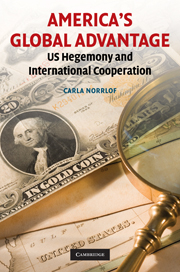Book contents
- Frontmatter
- Contents
- List of figures
- List of tables
- Preface
- Acknowledgments
- 1 Introduction
- 2 The forms and consequences of hegemonic leadership
- 3 Cooperation under hegemony
- 4 International trade cooperation
- 5 Interactive effects between monetary and commercial power
- 6 The security card
- 7 Credible threats and regional competition
- 8 Conclusion
- References
- Index
8 - Conclusion
Published online by Cambridge University Press: 19 May 2010
- Frontmatter
- Contents
- List of figures
- List of tables
- Preface
- Acknowledgments
- 1 Introduction
- 2 The forms and consequences of hegemonic leadership
- 3 Cooperation under hegemony
- 4 International trade cooperation
- 5 Interactive effects between monetary and commercial power
- 6 The security card
- 7 Credible threats and regional competition
- 8 Conclusion
- References
- Index
Summary
After sixty years of securing superpower status, and forty years of power sharing with the Soviet Union, the United States is the dominant power in the world today. Common sense tells us that it is good to be the unrivalled Great Power of the international system, king among states. But an important body of theory argues that being a small state is better than being the largest economic and military power. This book is an attempt to demonstrate that what most people believe intuitively is right after all. The single largest state benefits disproportionally from international cooperation.
There have, of course, been moments in the postwar era when other states have come out ahead, times when the United States has failed to influence other states, and when the economic and political foundations of American power have seemed shaky. For example, the United States did relatively poorly when the two smaller Great Powers (the European Community and Japan) were equally sized and together combined as much economic power as the United States did alone. Interestingly, this goes some way in explaining American support for accelerating European integration on other than ideological or cultural grounds. Since a strong Europe is more conducive to American interests than the diffusion of power between Europe and Japan, consistent with the international context from the mid-1970s until the early 1990s, America's encouragement of European collaboration can be said to have a rational basis.
- Type
- Chapter
- Information
- America's Global AdvantageUS Hegemony and International Cooperation, pp. 247 - 252Publisher: Cambridge University PressPrint publication year: 2010



